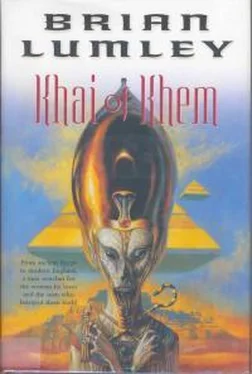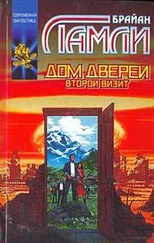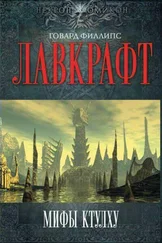He let Manek get up and they sat facing one another. Then Manek told all, haltingly at first but more hurriedly toward the end, eager to get it done with. When he had finished, they sat for some moments in silence.
Finally, Khai said, “Manek, our armies are waiting in Khem. They know nothing of all this. No one does, just we two. Will you come back now with me and lead your men against Asorbes, or do you prefer the one alternative?”
“What?” Manek was incredulous. “I don’t need your mercy, Khai. What’s the alternative?”
“Simply this,” the other answered, “to stay here in Kush—a traitor!”
“I was never a traitor to Kush!” Manek protested.
“Tell that to the Candace—” Khai got to his feet. “Anyway, you will be a traitor if you don’t return with me to Khem. Your army needs a leader and you’re it. Whether you’re worthy of their trust or not, they’d follow you to hell.” He moved toward the marquee’s door.
“Wait!” Manek also stood up. “And would you trust me, if I come with you?”
“It’s your one chance to clear yourself,” Khai grunted. “I would have to trust you.”
Manek looked down at the white sand floor of the marquee and nodded his head. “It will be much more to my taste to double-cross Pharaoh,” he finally said. “And in any case, he failed me miserably. You were supposed to be out of it, and look at you: there’s more fight in you now than ever there was! Very well, Khai Ibizin, I’ll come back with you.” And they left the tent together.
The first Ashtarta knew of the success of Manek’s search down the centuries was when her handmaidens awakened her. By then, Khai and Manek had taken a chariot and pair and were already heading down across the foothills towards Khem. Tethered behind their vehicle, a second pair of horses galloped with them, reliefs for the two in front when they were tired. The men of Manek’s escort had seen them leaving and were now shouting and rushing about the encampment, getting their horses, chariots and carts together so that they could follow their generals back the way they had come.
Within one chaotic quarter-hour, in total disarray, they had all left; and still Ashtarta was at a loss whether to laugh or cry. Imthra, too, had been awakened, and he also was both confused and delighted. Delighted that Khai was returned fit and well from what had seemed certain death, confused at his hurried departure, without a word to anyone. But Khai had his reasons. By now his men must be growing short of food; certainly they would be edgy, spoiling for a fight, squabbling among themselves. And what of Pharaoh? What of his Dark Heptad? What new horrors would they be breeding in that dreadful vault of theirs beneath the great pyramid? To linger in Kush, even for minutes, would have been to waste precious time. There would have been questions to answer and lies to be told. Manek had been spared that much at least—if he deserved to be spared.
Still, he had been the one to come down the centuries searching for Khai, and so save his life—or at least one of them! The blond giant owed him that much at least.
Now Khai lashed his horses to yet more speed and lifted his voice above the rush of air and the rattle of the chariot.
“Manek,” he cried, “what do you remember of that other world?”
“Very little,” the other yelled back. “Only that I found you there. It seems like a dream now.”
“A dream?” Khai repeated him. “Yes, I suppose it does. But I’ll tell you something—from now on it’s no dream. I have a feeling that as of right now it’s going to be purest nightmare!”
Two days later, with the sun just beginning its downward glide, Khai and Manek reached the place where the latter’s men were camped. By then Manek’s escort was within sight but still had not quite managed to catch up with the two generals. Khai waited at Manek’s camp long enough to see him take charge and begin issuing orders—which were for the organization of an immediate return to Asorbes—and then he drove off alone in the direction of his own camp. To get there he had to drive through Gahad Shebbithon’s positions, and though the sight of him in his chariot drove Gahad’s men into a frenzy of delight, still he did not break his drive. His reception at his own camp was similar to that accorded Manek by his men: a wildly excited melee of hoarsely shouting chiefs and cheering warriors, so that weary as he was from his journey, still he found himself uplifted and filled with a fierce pride. The uproar became louder still when he let it be known that he intended to take Asorbes the very next day.
Later, having rested for a few hours, he gave audience to a number of slaves recently escaped from Asorbes. There were six of them, young Nubians who wore their ankh scars not with shame but pride. Those marks burned in their foreheads were symbols of the oppression they had known in Asorbes; but they would paint them blazing red before they returned as soldiers of Kush, so that every Khemite soldier who saw them would know that these men would show no mercy. Khai applauded their savage determination, but he was more interested in the manner of their escape and asked them how they had managed it.
He was told that on the second day after Manek had taken him back to Kush, Khem’s soldiers had once again come forward from the city to deploy in their former positions. With Manek’s army out of the way, the Khemites had seen that they now held the upper hand. The Kushites were short two generals and one third of their warriors, and the balance had swung again in Khem’s favor. Before they could join battle, however, Adonda Gomba—the old Nubian King of Slaves—had organized an uprising against those overseers and guards who still remained within the city’s walls. To quell the rebellion, Pharaoh had been obliged to bring his troops back into the city. There they had remained until this very afternoon, and only now were they redeploying. The situation in Asorbes must therefore be well under Pharaoh’s control once more.
As for Adonda Gomba: when his uprising failed, he had gone into hiding somewhere in the slave quarters; but during the course of that diversion and in the general melee, these six Nubians had managed to shin down a rope tossed from the north wall and so make their escape. There had been a dozen of them in all, but the others had been only halfway down the rope when a Khemish soldier parted it with his sword.
“So,” said Khai when he heard this news, “the old slave-king is still alive, is he?—And creating mischief for the Khemites as of old.” And his eyes narrowed in deep thought. For memories of Adonda Gomba had given him the inkling of an idea, and the more he considered it, the more it appealed to him. He called several of his men to him and told them to find him an artist, then tore three small squares of fine white linen from the door-flap of his tent. When the artist, a youth of one of the tribes appeared, Khai bade him draw the following symbols on each piece of linen in its turn:
First—Adonda Gomba’s sign, which was a circle contained a triangle; next—a sketch of Asorbes with the north, south and west gates broken down; thirdly—a yellow sun rising over a green Nile; and finally Khai’s signature, which was a pyramid with a twig figure sliding down its side. To ensure that there could be no mistake as to the author’s identity, he had the artist sign the message yet again, this time with a blue eye. Then he quickly trimmed sections from the shafts of three red-flighted arrows and wrapped his messages about them, gumming them firmly in place.
All done, he called forward one of his best charioteers and they set off at a gallop westward, curving around Asorbes and passing back through Gahad Shebbithon’s camp, then turning eastward again and driving down onto that land which Manek Thotak’s forces had held. The slave quarters of Asorbes lay on this side of the city, and in his mind’s eye Khai clearly could see those dirty, vermin-ridden streets as he had known them so long ago. If he could put his arrows into the slave quarters, one of them was bound to find its way to Gomba. Then, when the armies of Kush drove against the city’s gates at dawn of the next day, perhaps Gomba and his army of slaves would be there to help—and on the inside, where they would be of greatest assistance.
Читать дальше








